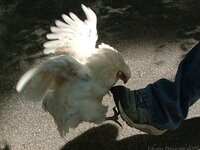Tame chickens are no doubt something important for most of us. I personally hate few things worse than a chicken that starts squawking and flying everywhere at my presence. That being said, it’s not always an easy or convenient task to tame your birds. Especially when you’re bringing home new birds from a previous owner who didn’t care about his bird’s behavior and you now have to deal with a particularly wild creature. Let’s look at a few methods for taming down chickens.

Chicks:
Taming chicks is easiest of all. And what’s more, if you hatch them yourself, they may even be strongly imprinted. An interesting fact is that by the time a chick is three days old it starts experiencing fear. So to by-pass this then ever-present aspect of fear, you need to hatch them yourself, because mail-order chicks are generally too old to imprint this way. And be sure to interact with them plenty in the early, fearless stages. Talking to the chicks while they are still in the egg during incubation will effectively aid in making the taming process-to come easier. And soft, easy talking and singing when around them will ever be an aid in taming. Once the chicks are in the brooder, be sure to never spook them by suddenly appearing overhead. This is one reason a brooder with see-through sides is desirable. It’s a common practice for brooders to be placed in out-of-the-way areas, which leads to skittish chicks when they are exposed to the real-world. Rather, it’s excellent to locate the brooder in an area that gets a lot of, non-stressing (e.g. pestering pets or birds are stressors), traffic. Always announce that you are approaching with a special call, or just soft talking. They’ll come to recognize your voice, and that’s especially good when they associate it with treats. Which that brings us to treats: Food/treats are definitely one of the best tools in taming. The birds will almost always get too comfortable with you when they see you as a treat dispenser!


Adult birds which are skittish:

Mean Roosters:
The blessed roosters! You either love ‘em or you hate ‘em, and I love them. I’ve had only one that was a mean bird, all the rest have been perfect. Most mean ones don’t ever get cured, they get eaten. Mine wasn’t cured either, he’d still go after other people, but he would leave me alone (for the most part). And I did everything some people say not to do when dealing with them, and find that there are no set rules to follow with them. Spraying them with a water gun sometimes works. Trying to get him to see you as a treat dispenser sometimes works. In my case, I chased him until he decided I was a dangerous predator. Even that won’t work every time.
Chicks:
Taming chicks is easiest of all. And what’s more, if you hatch them yourself, they may even be strongly imprinted. An interesting fact is that by the time a chick is three days old it starts experiencing fear. So to by-pass this then ever-present aspect of fear, you need to hatch them yourself, because mail-order chicks are generally too old to imprint this way. And be sure to interact with them plenty in the early, fearless stages. Talking to the chicks while they are still in the egg during incubation will effectively aid in making the taming process-to come easier. And soft, easy talking and singing when around them will ever be an aid in taming. Once the chicks are in the brooder, be sure to never spook them by suddenly appearing overhead. This is one reason a brooder with see-through sides is desirable. It’s a common practice for brooders to be placed in out-of-the-way areas, which leads to skittish chicks when they are exposed to the real-world. Rather, it’s excellent to locate the brooder in an area that gets a lot of, non-stressing (e.g. pestering pets or birds are stressors), traffic. Always announce that you are approaching with a special call, or just soft talking. They’ll come to recognize your voice, and that’s especially good when they associate it with treats. Which that brings us to treats: Food/treats are definitely one of the best tools in taming. The birds will almost always get too comfortable with you when they see you as a treat dispenser!
Adult birds which are skittish:
- As you may suspect, this takes patience. And always keep in mind that chickens are indeed individuals, they’ll all respond a little differently. As said, be patient, and don’t rush things. Here’s the best way I’ve found to deal with them.
- It’s very important not to give them any more reason to fear you than they already have. So never, not even when you’re in a rush and irritated, should you chase, or even try to touch/catch, them. That’s what predators do, and they are prey animals. And even if it’s not directed at them, try not to do anything that scares them. Always move slowly and predictably, but don’t be suspicious! It’s funny, but I’ve noticed the birds have a special sixth sense that will pick up when you’re specifically interested in them, it probably goes back to their prey instincts.
- That brings us to our next point, ignoring. I’ve found this to be a crucial step in dealing with certain birds. And again, it probably goes back to instinct and the chicken’s nature. Because, although chickens are flock creatures who need each other’s company, you may have noticed that they aren’t very attentive to each other, as in playing, touching, and that sort of thing. They really prefer to be to themselves, while having others nearby. Exceptions would be with hens and chicks, although that is a special and only temporary relationship, and maybe (some) roosters to hens. But the hens really don’t care for most of it! Predators are the other main thing that gives them much attention. So can you see why they are naturally wary of things interested in them? After you’ve been ignoring a bird, and it starts to wonder if you are no threat, then you should proceed to have it associate you with food/treats. Yes, it works miracles on the grown-ups, too!
- It doesn’t even have to be so much a treat, as it does just food. As I do, chickens love food, and they love to eat. And although it may be instinctive for them to eat all they can, when they can, I’m sure they enjoy it, and to go further, I say they are gluttons if there ever existed any. That being said, in the majority of cases, if you have food on your side, you stand before a defeated foe. An important note, is that most people free-feed their birds. That is, they allow them unlimited, 24/7 access to all the feed they could want to eat. That sounds ironic, doesn’t it, after what I just told you about chicken’s appetites? Well, it is. And it’s as unhealthy as it is wasteful. I measure my bird’s feed. Giving them only what they need of their grains/pellet mix, and any extras come only through scraps and range. You should follow something similar with your birds, especially during taming. In doing this, they have what they need, but not all they could want to eat, so they are always anxious to get extras, which come as a welcome treat.
- After they are responding well to feeding, you lure them in closer and closer with the food, still acting as if you’re ignoring them. They should eventually get right by your feet, and afterward, you start to kneel down. Then feed them in such a way that they are around/brushing your legs or arms. Eventually they should hop into your lap to get at the food. And not all cases are this extreme, of course. But I have had those extremely flighty birds settle down this way.
- On closing this section, I might mention that putting the troubled bird(s) in with an already tame flock also works wonders for settling them down.
Mean Roosters:
The blessed roosters! You either love ‘em or you hate ‘em, and I love them. I’ve had only one that was a mean bird, all the rest have been perfect. Most mean ones don’t ever get cured, they get eaten. Mine wasn’t cured either, he’d still go after other people, but he would leave me alone (for the most part). And I did everything some people say not to do when dealing with them, and find that there are no set rules to follow with them. Spraying them with a water gun sometimes works. Trying to get him to see you as a treat dispenser sometimes works. In my case, I chased him until he decided I was a dangerous predator. Even that won’t work every time.





 So. I guess just like the writer of this article breaks all the rules when it comes to taming roosters, some of us are just as happy to break all the rules when it comes to feeding our flocks.
So. I guess just like the writer of this article breaks all the rules when it comes to taming roosters, some of us are just as happy to break all the rules when it comes to feeding our flocks.